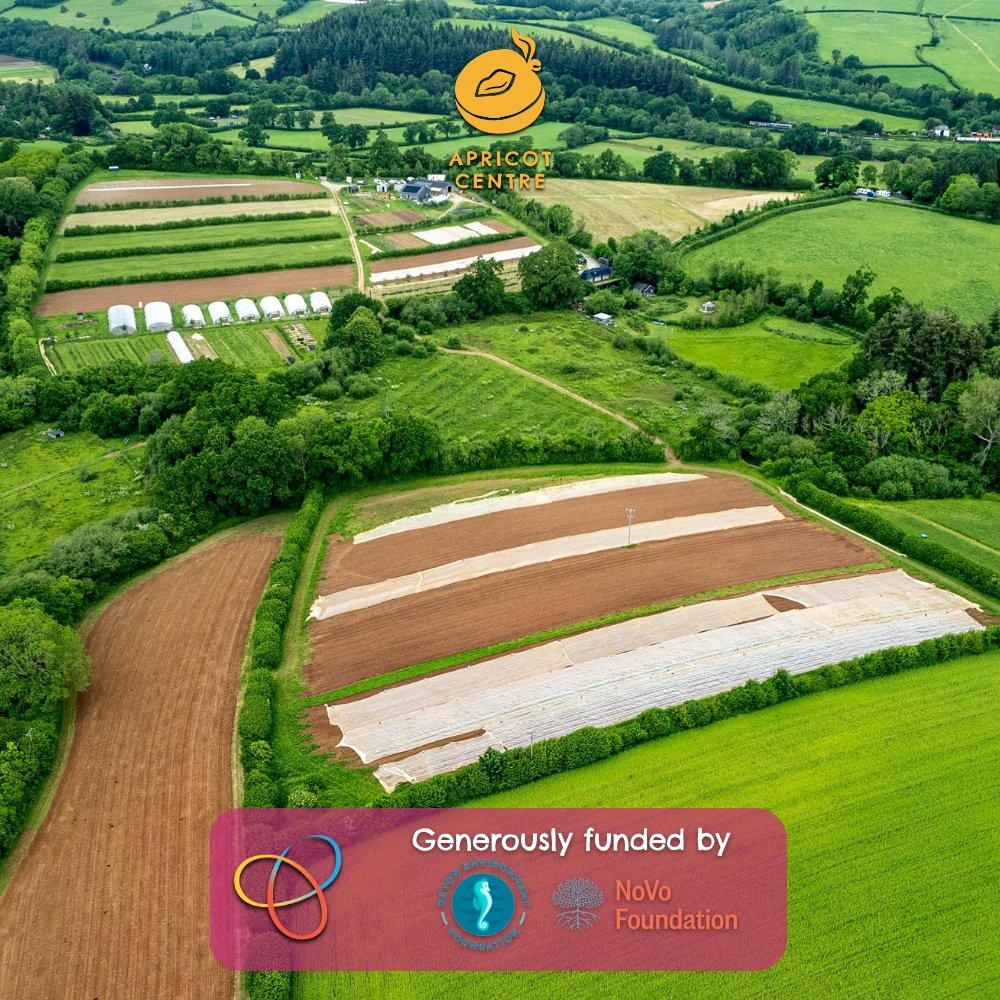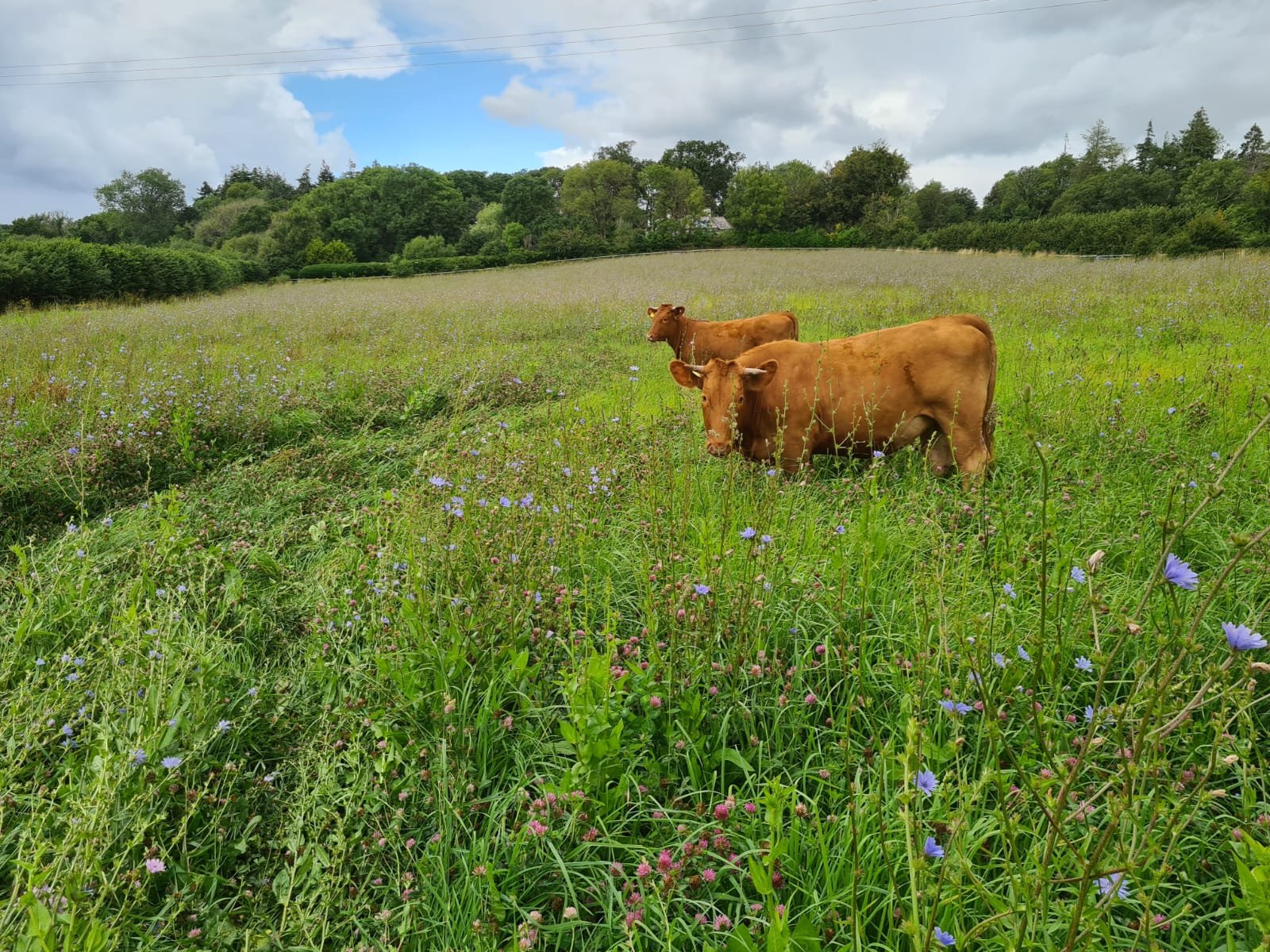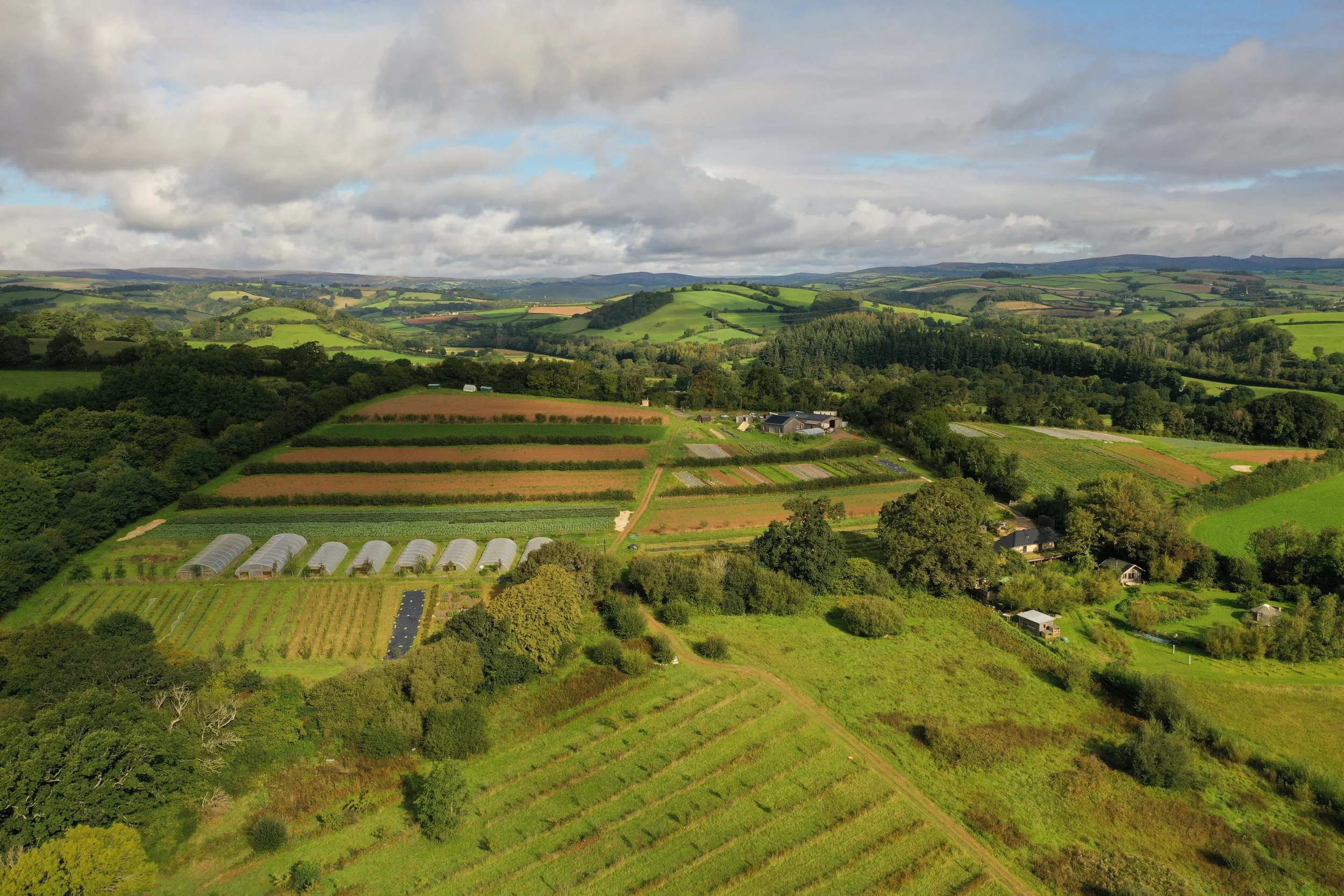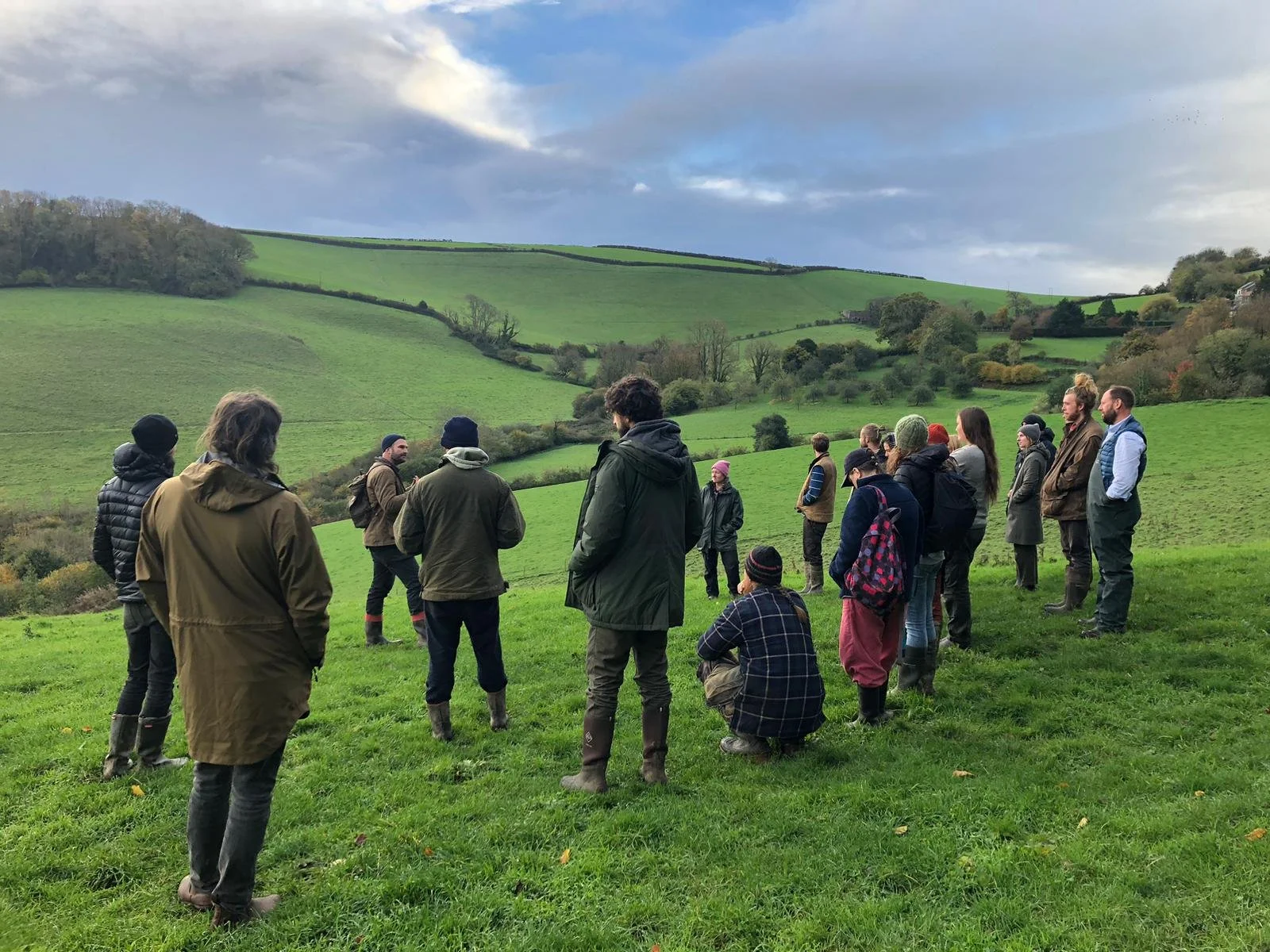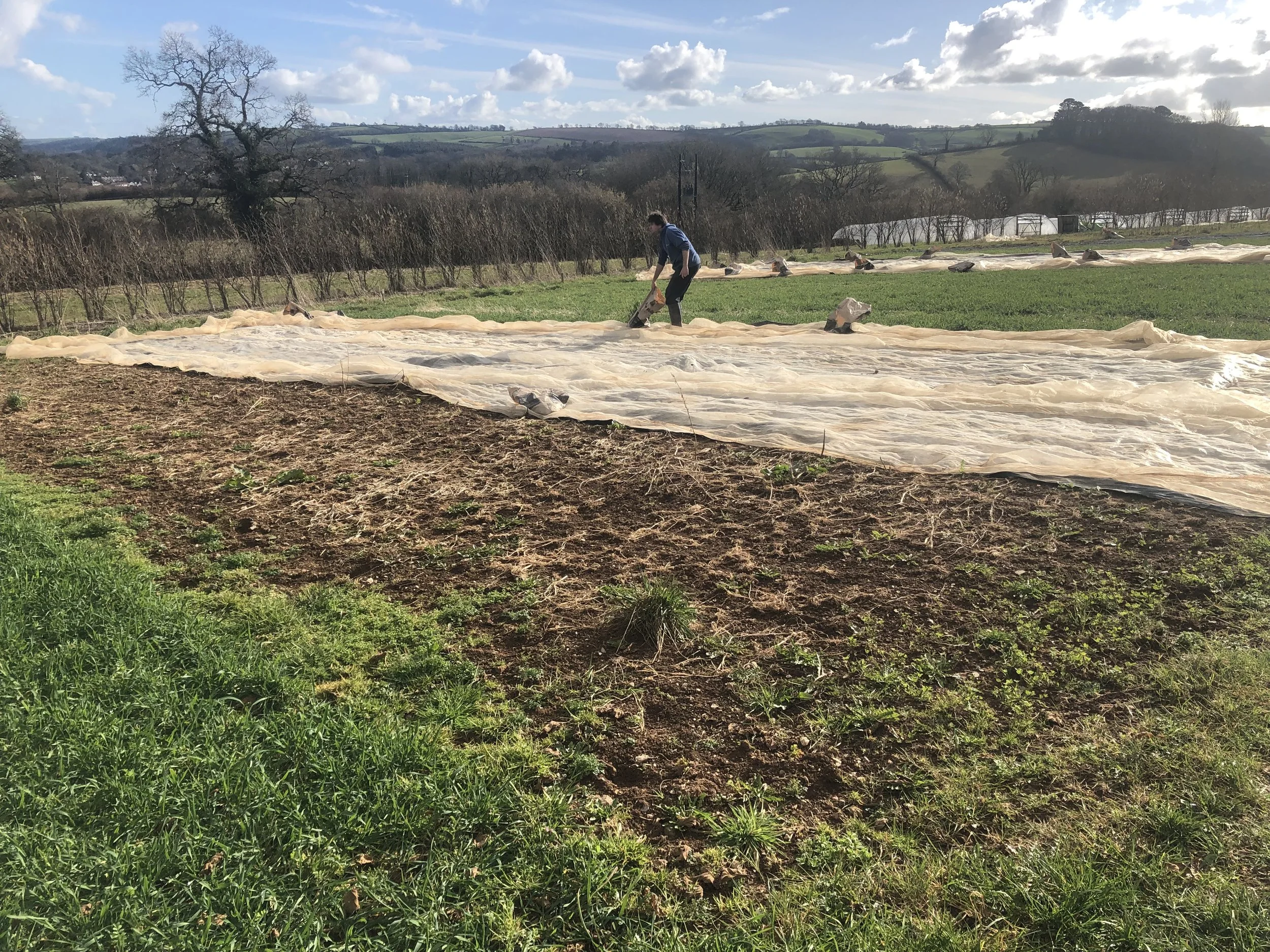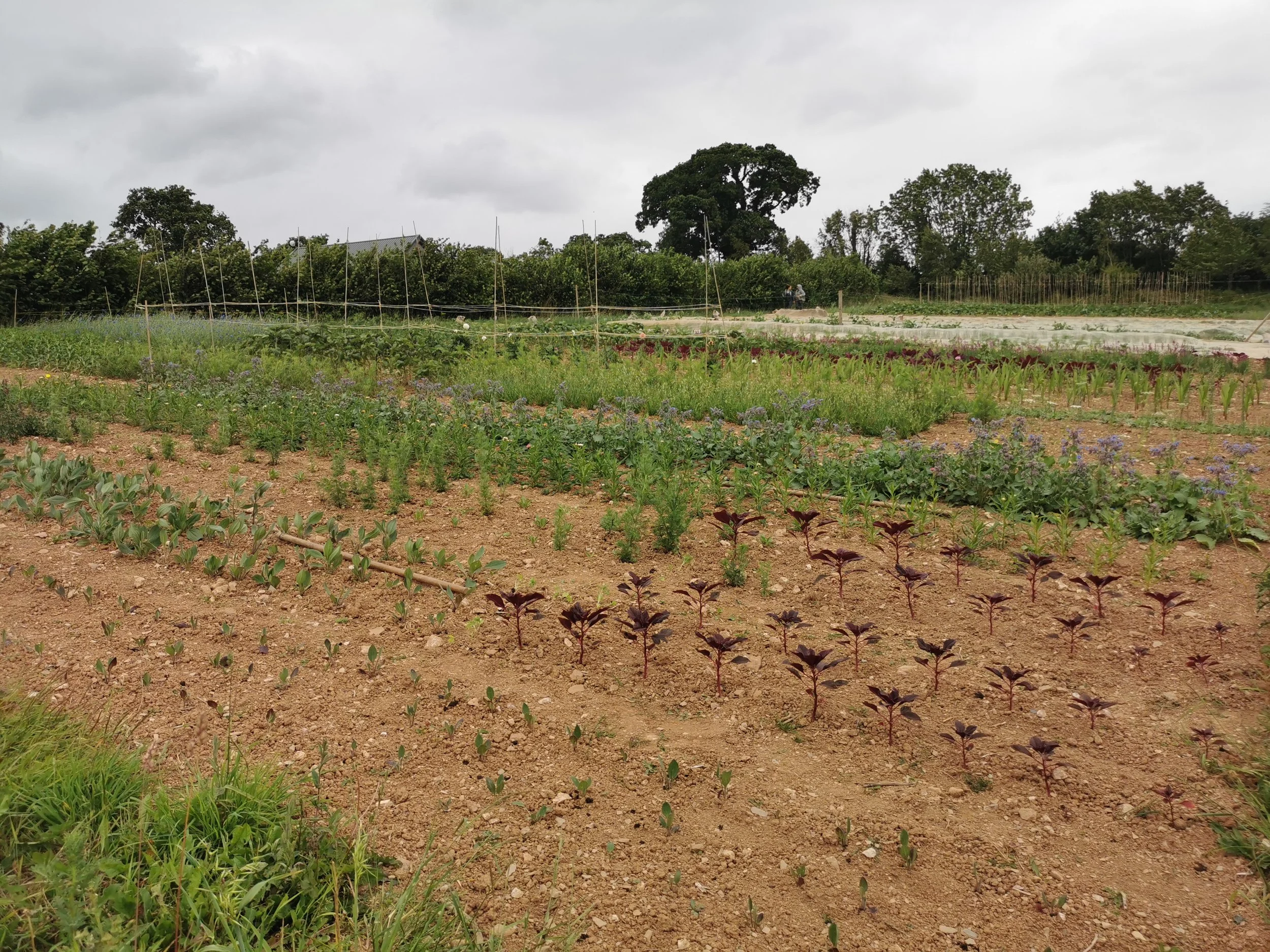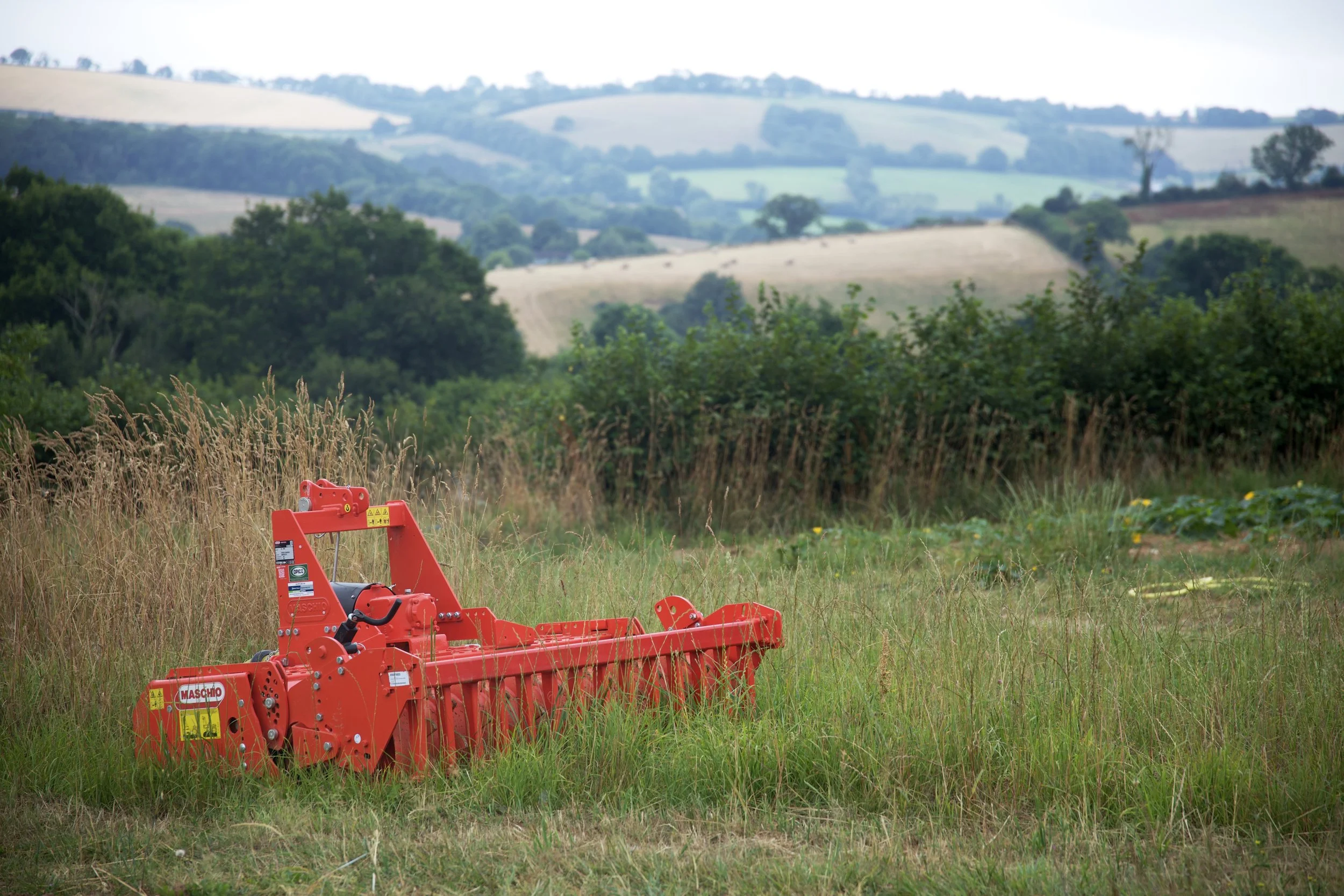Level 3 Diploma in Regenerative Land-Based Systems: Agroecological Food & Farming
Free for participants and certified by Crossfields, the Apricot Centre @Huxhams Cross Farm presents the Level 3 Yearlong Diploma programme in Regenerative Land-Based Systems to help people transition into, or upgrade their skills in, the world of agroecological, organic and regenerative farming methods.
APPLICATIONS ARE NOW OPEN FOR THE 2026 COHORT
Applications will close 1st of September 2025 so that work experience placements can be sorted in time.
The Apricot Centre CIC is once again offering its flagship yearlong Level 3 diploma programme with land based learning and work experience accompanying academic study. The programme runs from January to December for 5 days a week (4 days on a work experience placement farm and 1 day academic learning at the Apricot Centre). The traineeship offers an authentic opportunity of working on a farm, in a woodland, or with a food producer alongside a free level 3 qualification in Regenerative Land Based Systems as well as a Permaculture Design Certificate.
The level 3 diploma qualification is Ofqual-regulated and awarded by the Crossfields. The Permaculture Design Certificate is awarded by the Permaculture Association.
The academic course itself is valued at £7000 and is provided FREE as part of the training alongside the work experience. It is made possible by generous funding by the NoVo Foundation through Devon Environment Foundation.
As a student, you will receive:
An academic Level 3 Diploma course;
Work experience placement on a host farm;
Student accommodation on or near your placement as part of the academic course;
Pastoral care, tutoring and free mental health counseling upon request;
Free training resources such as books;
Free access to relevant themed events at the Apricot Centre (e.g. book talks, film screenings)
Support for PPE clothing;
Support for living expenses during the course*;
Access to a bursary fund which can be applied for during the course to help support you during the year‡;
Access to a bursary fund which can be applied for to help set up a project after graduation‡;
Access to our student and later our alumni community for social connection, networking, further learning and jobs & opportunities.
* Students will be reimbursed for up to £80 per week for training related expenses. Students will need to collect and keep expense receipts for the amount of the allowance.
‡ The bursary fund is generously provided by the Chasegrove Family Foundation and UKSPF.
Designed for people 19+, we welcome applications from all diverse backgrounds and life experiences. You will need to have previous qualification of GCSE grade D or above or equivalent. (If you are unable to meet this requirement please contact rachelphillips@apricotcentre.co.uk to discuss alternatives.)
As we are unable to sponsor students visas, the course is only open to people who have a legal right to live and work in the UK (valid visas, (un)limited leave to remain ("(pre-)settled status"), citizenship). The course extends beyond the 6 months allowance of EU citizens.
PLEASE NOTE MOST PLACEMENTS REQUIRE STUDENTS TO DRIVE AND HAVE ACCESS TO A CAR. YOU WILL NOT BE ASKED TO PERFORM WORK DRIVING DUTIES AS PART OF YOUR WORK EXPERIENCE - IT IS SIMPLY DUE TO RURAL ACCESS AND LACK OF PUBLIC TRANSPORT.
In proud cooperation with…
THE COURSE INCLUDES THE FOLLOWING MODULES:
-
This unit introduces the concepts and methodologies of regenerative land based systems, why they are needed to offset climate change and how to evaluate their impact. In a time of climate change, biodiversity loss and the need to produce healthy food, regenerative food systems are able to meet these challenges. Regenerative systems are a complex set of farming and land based methodologies. In this unit, learners will be introduced to the breadth of these methods and how the impact of them can be assessed in a land based business.
-
This unit introduces learners to soil science concepts and practice, including the carbon cycle and soil biome as key components of regenerative land based systems. Learners will be introduced to recent changes in the understanding of soil science, to include soil ecology and the carbon cycle. They will understand how to manage soil to mitigate and adapt to climate change. They will understand the importance of soil science as a key concept in how to manage land in regenerative systems.
-
This unit introduces learners to the science and ecology of plant and crop growth, which are key components underpinning the management of regenerative land based systems. Learners will understand that regenerative cropping systems are based on ecology, the carbon cycle, and a deep understanding of a reciprocal and circular model of food production. Learners will be introduced to these concepts in the context of crop production and how they can be managed to produce food.
-
This unit introduces learners to the science, nutrition and behavioural aspects of holistic livestock management in regenerative land systems. Learners will understand how livestock can be incorporated into regenerative systems, to improve the soil ecology and biodiversity. Learners will understand how livestock can be managed to reduce their carbon footprint, and to fit into complex carbon and nutrient cycles, and how to maximise their health and welfare in a land based system. The unit will include apiculture and functional biodiversity on a system.
-
This unit introduces learners to the principles and ethics of Permaculture. Learners will be introduced to the origins and principles of Permaculture as a design methodology for designing sustainable land and non-land based systems. Learners will understand how Permaculture is part of a toolkit that can be used for creating regenerative land based systems. Learners will develop an understanding of how Permaculture design practice, ethics and principles are applied to the built environment as well as develop a range of personal and interpersonal skills that inform how they can use these skills in ethical and regenerative systems. This unit leads to a Permaculture Design Certificate (PDC) qualification awarded by the Permaculture Association alongside the Level 3 qualification.
-
Discover how Nature and regenerative farming helps heal us not just physically, and how you can provide more than just food from your land.
-
In this unit, learners will be introduced to the concepts and types of agroforestry systems and their use in regenerative land based systems. Learners will explore how trees are incorporated into the farmed landscape as silvo-arable, silvo-pastoral and silvo-horticulture systems, as well as food forests. They will identify suitable tree species for different soils and sites, and understand the benefits and challenges of using trees in a farmed landscape. They will understand how to design effective agroforestry system for a farm.
-
In this unit, learners will be introduced to provide an introduction to simple business planning methods, business structures and community supported agriculture systems. Learners will explore how regenerative land based systems aim to re-localise sales and shorten the supply chain, and the methods of achieving this. Learners will understand that businesses need to be economically regenerative, pay fair wages, and to become financially sustainable in the long term. Learners will be able to explore how to model business “for purpose” rather than profit.
-
Numbers are not enough for success; you will also learn how to plan the long term future, funding and running of your land-based business.
-
In this unit, learners will be introduced to the principles and practices of Biodynamic farming systems. Learners will explore how Biodynamic farming was the first ecological farming system to arise. They will also understand how it offers a unique approach to farming and food systems. Learners will gain an overview of this system, its principles and practices and its codification, and how it differs from organic systems.
-
In this unit, learners will be introduced to all aspects of water including water cycles and the management and usage of water as part of a whole farm approach. Learners will explore how healthy water management can provide balance in the storing and use of water. They will understand how many traditional ways to hold the water in the landscape that were practiced indigenously all over the world are being rediscovered and redeployed within a modern understanding of geology and the water dynamics of climate and farming. Learners will understand how to apply water management principles it in the context of a farm.
-
In this unit, learners will understand how the quality of food from a regenerative system differs from the quality of food from and industrial food system. Learners will understand how sourcing food from a regenerative system affects consumer health in relation to increasing the range and amount of fresh fruit and vegetables they eat. They will explore how Industrial foods are often are lower in nutrient levels and secondary metabolites as they contain pesticides, and high levels of nitrates, both of which impact human health. Learners will also explore the complex issues of food poverty in regenerative systems.
-
Students spend four days per week on their host farm, learning directly on the land. They write a learning log of their time, as well as have a chance of applying what they have learned on the course directly with the guidance and support of their hosts. The learning log can take several forms, and will have to be signed off from time to time during the year.
THE YEAR LONG TRAINEESHIP WILL PREPARE YOU TO:
Work in agroecological farming or small holding type settings using organic and regenerative practices;
Work in post-harvest roles such as food processing in agroecological food products;
Work in community supported agriculture or the circular food economy;
Work in agroecological land based systems that aim to regenerate the landscape and the soil;
Progress into higher education courses such as our Level 4 Regenerative Food Systems (starting January 2027) and degrees in relevant areas.
FURTHER BENEFITS OF THE PROGRAMME
Benefits for the farmer
Farmers can benefit greatly from hosting work experience placements as they can provide valuable hands-on experience in sustainable land management practices. By taking on students, farmers have the opportunity to share their expertise and passion for farming with the next generation of agricultural professionals.
Students also bring fresh perspectives and ideas to the farm, helping farmers to stay current with new advancements in farming practices. This exchange of knowledge can lead to improved efficiency and productivity on the farm.
In addition, hosting students can help farmers build strong relationships within the community and industry. By opening their farm to students, farmers can become seen as leaders and mentors in the agricultural community, gaining recognition and respect for their commitment to education and sustainability. They also have a chance to connect with other hosts in the field, expanding their network. Hosts are also welcome to attend any specific teaching days with topics of interest.
Overall, hosting student work experience placements can be a rewarding experience for farmers, allowing them to give back to the industry while also receiving valuable assistance and fresh ideas for their farm operations.
Benefits for the student
A year long course gives a real experience about what it is to be a grower, livestock farmer or woodland manager. Learning from an experienced person on the land will give you confidence and valuable practical skills. Coupled with the Level 3 qualification’s theoretical and practical knowledge in Regenerative Land Based Systems, you will have an excellent basis to start or continue your land based career.
Benefits for the green sector, food, farming and land based businesses
The aim of this course is to train the next generation of farmers and growers in agroecological and regenerative farming systems. This will aid farms and woodlands to sequester carbon and support biodiversity whilst still producing local food and other produce.
“IS THIS COURSE FOR ME?”
Every year we are extremely fortunate to have a wide range of applications from diverse backgrounds that far exceeds the capacity of the course, usually by four- or five-fold. The selection process is one of great care, deliberation and difficult decisions, both for the Apricot Centre and for the work experience placements. We work hard to make sure we find the best fit for everyone.
It is important to know that the course has both a strong academic element that requires in-person attendance (at least 80%), study and assignment writing requiring 4-5 hours per week (it is not an NVQ), as well as the work experience placement which is physically, and especially on long, dark rainy winter days, psychologically demanding (which, to be fair, is the reality of farming). While we make every effort and go above and beyond to support students through the course including accommodate any learning difficulties, and the student community itself is a wonderful social network, prospective applicants should reflect on their ability to make such a commitment for nearly a year, from physical, psychological, social, academic and financial perspectives. There is also no guarantee that you will be able to stay and find work in the field in South Devon after the course - most of our alumni go far and wide to carry the torch of agroecology and settle in jobs elsewhere.
The course alternates between heavy social interaction during course days and, depending on your placement, working in smaller teams, potentially with another student or students at your host farm. In some cases, you may be living in the same accommodation as other students or on site with other employees. In order to be able to get the most out of the course, please reflect on how well you work with others and whether you are able to handle any interpersonal conflicts in an appropriate manner.
If you live in the area, you are, of course, able to live at home and commute to your placement. If you are already a farmer, you may be able to “self-host”, just have a conversation with us.
If you are contemplating exploring working on the land but do not wish to commit to a course as long and intensive as this, or if you are not interested in the academic diploma qualification aspect of the course, we recommend exploring volunteering opportunities, WWOOF-ing and WorkAway trips (both in the UK and abroad) to dip your toes in and see if land-based work really is for you, as well as to explore the many ways it is done. If you are ready to commit after the exploration, we will most certainly welcome your application for any future cohort.
If you are unsure whether the course is for you, we are very happy to have a conversation with you and hopefully help make the best possible choice for you. Please don’t hesitate to get in touch!
HOST PLACEMENTS
When filling out the application form, you will be asked to pick a first and second choice host on your application form. If you are not accepted by, or after interview would rather not be with, your choice of hosts, you will be informed of remaining host places and can choose to apply to them. Please do not try to make more than two host applications in one go or put the same place twice, it never works out well in our experience.
Consider the hosts you wish to be with most and give detailed, tailored reasons in your applications for why you want to work with them. Hosts are far more interested in your passion, commitment and desire to work in the field, like to see if you’ve “done your homework” on them, and applications like “I walked [i.e. trespassed] through your farm and polytunnel and thought it was very nice.” are likely to be out shined and go to the bottom of the pile very quickly (yes, we’ve had actual, entire applications along those lines).
If you perhaps wish to arrange a visit to your prospective hosts outside of the application process, this has to be of your own initiative. We cannot arrange any host visits nor pay towards any visits or interviews you arrange, should you need to travel.
-
About the placement
Teign Greens is a Social Enterprise providing weekly organic vegetable bags to local members in the Teign Valley South Devon. It was established in 2020 to provide a resilient local food system in response to the Covid Pandemic and has grown quickly since. The Market Garden is based on 5 acres of land at Oxen Park Farm, in Lower Ashton, and shares many resources, buildings and machinery with the wider farm, also home to the education CIC On The Hill. This summer we will provide up to 100 weekly veg boxes to customers using a ‘community supported agriculture' scheme, meaning members commit to buying the veg over a whole year. Volunteers are a key part of the growing and harvesting of the vegetables, led by a core team of experienced growers. The farm is organic and biodynamic, and producing our vegetables in a way that supports nature and biodiversity is a key priority for us.
Work experience summary
We're a small team and our work experience student will be fully immersed in all aspects of the organisation. We'll expect you to take on a lot of responsibility, and be part of team meetings and decision making. Often, you'll be working alongside our friendly volunteer team, tending crops, picking and packing veg bags. Other times you may be working independently on tasks we've explained to you like seed sowing or weeding. In the winter, its much quieter and you might help with admin on the computer, maintenance jobs or even deliveries. By the end of the year, you should have a good sense of how to grow a variety of crops throughout the year and manage a CSA market garden.
Accommodation
Caravan
Other useful information
Teign Greens is based in a beautiful but remote location, with extremely limited public transport so a car is a must! We would accept couples.
Website
-
About the placement
Ambios Ltd is a not for profit nature conservation/nature recovery training organisation. we have a history of project delivery around training the next generation of wildlife professionals, and over recent years we have created a centre on the Sharpham Estate, South Devon. at Sharpham we provide traineeships to people looking to establish and develop their careers in the nature sector. the traineeships are foundation level, with introductory content around specieis id, habitats assessment, practical countryside skills through to interpretation and outward communiction. our centre is a working farm and nature recovery project, on 130 acres of rolling south Devon hills, that involves rewilding, livestock handling, organic horticulture growing and wood pasture creation. we host trainees as well as work in partnership with a local charity for adults with learning difficulties who carry out much of the day to day work on the farm.
Work experience summary
Your role will be split between our educational organic horticulture market garden and our community forest tree planting initiative, supporting public engagement, volunteers, trainees and educational activities and events. your work in the market garden will be in assisting our gardener in scaling up our garden productivity, and overseeing the chages we have intended for upgrading our soil, improving our growing beds and enhancing access. Your time with the tree planting efforts across the farm will follow the seasons, planting in the winter, building tree guards in the summer, as well as supporting livestock grazing and interactions with pasture management. A good work ethic, problem solving attitude, ability to get on well with people, ability to work well in a team, ability to follow instructions, but to have autonomy over your own work and be able to manage multiple priorities at once, and a growth mindset are all great things to bring.
Accommodation
Your accommodation will be in your own private room. your residential experience will be shared with others, living as part of a community of like-minded trainees and volunteers. your own room will be either in our bunkhouse accommodation or in a wagon tiny home. you will have access to a well equipped kitchen, comfortable living room and shared bathroom.
Other useful information
You will live and work on our farm on the beautiful Sharpham Estate, overlooking the river Dart valley. Our farm is a 40 minute walk to Totnes, our local town, 15 minute bike ride. Parking is available on the farm. you will share the placement with one other trainee. We will accept couples.
Website
-
About the placement
Real Food Garden is a small mixed farm practicing restorative agriculture. Established and run by Amelia Lake and Chloe Bines, the farm is located in mid-Cornwall near Bodmin. From our 10 acre holding we grow seasonal vegetables and fruit in a two acre market garden, raise native-breed livestock on pasture, and operate a small on-site farm shop. We are committed to sustainable farming practices that work with nature, not against it, building soil health, supporting biodiversity, and producing good food for our community. Our mission is for truly sustainable food production that nourishes people and place. We are rooted in our values of respect, reciprocity and restorative agriculture. Our work is guided by agroecological principles, and we have a particular interest in closing the loop between food production, ecological stewardship, and community connection. We sell our produce directly to local households through a veg box scheme, as well as at local markets and through the shop. The business was founded in 2016 and has grown steadily, combining hands-on growing, small-scale ethical livestock farming, and a practical understanding of running a land-based enterprise. The site is part of a wider ecological landscape, our beef cattle graze on Helman Tor for the Cornwall Wildlife Trust, and we’re interested in how farming can contribute to restoring land, supporting livelihoods, and rethinking our food system from the ground up.
Work experience summary
The core of the placement will be working across our two-acre market garden, which forms the heart of the farm and business. The site includes one acre of intensively managed no-dig beds and one acre of field-scale production, giving students the opportunity to gain hands-on experience in both systems. In the no-dig area, trainees will learn about permanent bed systems, soil health, and intensive cropping suited to high-value direct sales. In the field-scale area, they’ll work on larger-scale cropping, including the use of machinery, crop rotation planning, and season extension methods. Across both areas, students will be involved in the full growing cycle, from propagation, soil preparation, sowing, and transplanting, through to weeding, pest management, harvesting, and post-harvest handling. In addition to the market garden, trainees will also gain experience in: - Working with our small herd of native cattle (English Longhorns) and Jacob sheep, including pasture management and low-stress livestock handling - Helping with our pasture raised pigs and poultry - Assisting with running our farm shop and veg box scheme — giving insight into local food distribution and customer relationships - Supporting us at local markets and food events - Learning about the business side of running a small farm, including planning, marketing, and pricing - Participating in community events and educational activities, if they align with the student’s interests This is a varied and rewarding placement for someone looking to deepen their practical skills in small-scale food production, and who is interested in the realities of running a land-based business that is both ecologically and economically resilient.
Accommodation
We can offer simple on-site accommodation in a caravan with own kitchen and access to shared compost toilet & shower facilities. We have Wi-Fi and laundry facilities on site too. It is a simple but comfortable setup, suitable for someone happy with basic rural living. Accommodation is provided on a self-catering basis. We also live on site in a caravan.
Other useful information
The farm is in a rural location with no regular bus service; students will need to be able to drive or arrange transport. We can accept placements for individuals or couples (please get in touch to discuss). The work is physically demanding at times and takes place in all weather. The placement would suit someone with a genuine interest in regenerative agriculture, local food systems, and ecological land management. We aim to be a supportive and inclusive placement. Our team is small, and students will work closely alongside us as part of the day-to-day running of the farm.
Website
-
About the placement
Dalditch Farm is a 221-acre organic and regenerative livestock farm, beautifully located between the Jurassic Coast at Budleigh Salterton and the Pebblebed Heaths National Nature Reserve in East Devon. We produce 100% grass-fed beef and lamb, alongside pasture-raised chickens, turkeys, and geese for the festive season. Our farming system is rooted in Holistic Management and regenerative principles, drawing inspiration from pioneers such as Joel Salatin, Richard Perkins, and Allan Savory. Our aim is to produce nutrient-dense food in a way that enhances animal welfare, restores soil health, and supports local biodiversity. All our produce is sold directly to customers through our website and our small self-serve farm shop, helping connect our community with high-quality, ethically raised meat. We welcome enthusiastic and curious trainees who are keen to deepen their knowledge of organic and regenerative agriculture. Placements at Dalditch Farm offer hands-on experience in animal husbandry, low-stress livestock handling, pasture management, holistic grazing planning, and the daily realities of running a diversified, nature-friendly farm. With your support, we hope to continue growing our impact — expanding our ecological reach, engaging more people in the story of real food, and championing the future of regenerative farming.
Work experience summary
As a trainee at Dalditch Farm, you'll gain hands-on experience across a wide range of activities that reflect the daily realities of running a mixed organic and regenerative livestock farm.
Key tasks may include:
- Animal care and daily livestock checks (cattle, sheep, poultry)
- Grazing planning and pasture management
- Fence building, hedge and tree planting, farm maintenance, and small construction projects
- Assisting with meat packing and preparing customer orders
- Supporting farm events and open days
- Capturing on-farm content for social media and marketing
Because our farm is deeply seasonal, your role will vary throughout the year — from chick brooding and lambing in the spring, to poultry rotations and haymaking in summer, through to autumn harvests and winter preparations. This is a great opportunity to build practical skills, deepen your understanding of regenerative agriculture, and play a meaningful role in a farm committed to sustainability, animal welfare, and good food.
Accommodation
Accommodation is provided in a comfortable three-bedroom static caravan located on the farm. Each trainee will have their own private bedroom, while kitchen, dining, shower, toilet, and living/TV room facilities are shared. The accommodation is fully equipped with high-speed WiFi, laundry facilities, and everything needed for day-to-day living.
Other useful information
Dalditch Farm is located just 2 miles from the seaside town of Budleigh Salterton, offering easy access to the coast during your time off. We’re well connected by public transport, with train stations nearby in Exeter and Exmouth, and both national and local bus routes running into the area. While the farm itself is in a rural location, we have bicycles available for trainees to borrow, making it easier to get around locally. Although having your own vehicle is not essential, it may offer greater flexibility during your stay. If you're looking for a placement that balances meaningful work with access to nature and the coast, this could be a great fit.
Website
-
About the placement
This placement is based in the 10-acre gardens overlooking the Dart that surround Sharpham House. The gardens consist of a walled kitchen garden, lawns, ornamental borders, orchards, a woodland garden, and wildflower meadow. The Sharpham Trust is a charity based at the historic Sharpham House and Estate on the banks of the River Dart close to Totnes. Our ethos is the desire to build a more mindful, compassionate and environmentally-sustainable world. We do this by connecting people with nature and fostering mindfulness and well-being through our programme of retreats, mindfulness courses, public events, outdoor learning and the arts. The 500-acre estate is managed organically and includes 3 retreat centres, rewilding fields, a natural burial site, reed beds, marshes, wildflower meadows, farms and gardens.
Work experience summary
At Sharpham Trust you will be working in the 10-acre gardens that surround Sharpham House. You will gain comprehensive training and experience in a broad range of horticultural areas including all aspects of running a sustainable, no dig walled kitchen garden, managing ornamental borders, lawns, woodland and orchards. You will join a passionate and knowledgeable small team who work hard to create and maintain beautiful, productive and environmentally sustainable gardens where wildlife can thrive and people can connect deeply to nature. The majority of your time will be spent outdoors in the gardens learning through doing. Work is divided across the growing spaces to give you broad experience. In our productive gardens this will include growing vegetables, fruit, cut flowers and an extensive range of culinary and tea herbs. Tasks will vary from preparing beds, propagation, to harvesting, irrigation, working in our polytunnel and 100-foot glasshouse and managing apple and pear orchards. In our ornamental gardens you will be mowing lawns, strimming woodland areas, maintaining ornamental borders and more. This traineeship will include some light machinery use such as pedestrian mowers and strimmers for which training will be given. You will also help oversee gardening sessions for people on retreat here. This is a role for someone who is well organised with excellent communication skills and the ability to work on your own initiative, as part of a small team. You will have a passion for sustainable food growing and ornamental gardening as well as flexibility and a sense of humour. We are looking for trainees who are enthusiastic, practical and keen to learn and contribute to a hard-working team. An interest in the Trust’s environmental aims and mindfulness would also be an advantage. Students will have some opportunity to experience the Trust’s programme of mindfulness meditations, courses and retreats.
Accommodation
We provide fully-equipped accommodation on-site. A shared 3-bedroom bungalow with all the amenities, right next to the gardens and with a view down the River Dart to the nearby town of Totnes.
Other useful information
We are located 3 miles from Totnes and on the edge of the village of Ashprington. Having a car is an advantage but not essential as there is a direct bike path to Totnes which takes 50 minutes to walk and 25 minutes to cycle. From Totnes there are good public transport links by bus and a train station with good national links. We are a small team who work closely together and you will be living and working with your fellow trainee 24/7. It would be an advantage if you have previous experience of shared living, are communicative, respectful and open-minded so that everyone can enjoy a harmonious experience.
Website
-
About the placement
The Hillyfield is a small woodland restoration project on the edge of Dartmoor, just between Totnes and South Brent. We look after 46 acres of mixed woodland and pasture, a stretch of the river Harbourne, orchard, willow osier, coppice, and some livestock (currently chickens and pigs). We work as a team, with a small group of willing helpers engaged in all aspects of land management. We've looked after the land since 2010. The forestry work includes running a sawmill and making firewood, timber products and caring for the young trees we have planted.
Work experience summary
The main role is assistant woodland manager and support with growing. As a key part of the team your placement will involve taking care of chickens and livestock, help in the garden with growing, training on forestry tasks to take a responsible role in activities such as charcoal making & bagging, cutting timber on sawmill, firewood processing, ride management etc. You will be really keen to get involved in a working woodland. Flexible and happy to be part of a team / family environment, and able to work responsibly under your own steam. Important is to have a driving licence (ideally your own vehicle), or be a keen cyclist. Helpful if you have a chainsaw qualification although this can be worked towards. Experience in volunteering and living close to the land will make the experience of being out in the woods more digestible! Skills in carpentry or a willingness to get involved in practical skills desirable. Willingness to learn and engage / experience in growing and animal husbandry desirable.
Accommodation
You’ll stay in a caravan. We are currently building some improved accommodation in timber cabin type caravans.
Other useful information
Although on a cycle path, and very close to a main road, we are fairly remote. Bus is a 30minute walk away. Nearest town (South Brent) 35minutes. Totnes a 40minute cycle away (and 1hr back). Need to discuss any extra things like partners / pets or other needs.
Website
-
About the placement & work experience summary
3 acre organic market garden on the Dartington Estate, structured as a CIC and functioning as a CSA. We grow to provide 100 veg shares each week for our members. Growing-wise, we have a BCS 2 wheel tractor, other than that it is people power. We are 2 main growers, we have a weekly volunteer day which is a good social occasion, and seasonal events through the year. We also grow a number of commercial seed crops and sell salad to a few local businesses. As a small team, our work is diverse from veg growing to business planning, event planning, and managing groups of volunteers. We enjoy the diversity of this.
Accommodation
Accommodation is provided - during the winter months in rented premises, on site in a yurt during the summer months.
Other useful information
Driving is not essential but may be desirable for the student’s mobility.
Website
-
About the placement
Baddaford Farm is the home of Riverford founder Guy Singh-Watson’s and his wife, Geetie Singh-Watson. The farm is situated in beautiful South Hams, not far from Dartington. They are offering one residential placement, ideally suited to those with an interest in organic commercial farming, especially growing perennial fruit and vegetables. This is a fantastic opportunity to learn alongside skilled and experienced growers, as well as being part of a wider community of like-minded, independent businesses, as Baddaford is also home to the Baddaford Farming Collective. The Collective is a small cohort of 5 land-based businesses, which means working and living at the farms offers the trainee an opportunity to be truly immersed in a diverse community of small-scale farmers.
Work experience summary
You will be part of a small, diverse core team of 4, which rises to 20+ during peak periods. The mission of Baddaford Farm is to demonstrate that ethical, organic farming can be commercially viable, so, expect the work to be physically demanding. Baddaford grows mainly perennials, important food crops for the future of ecological farming, therefore the work may be less varied than other placements, but this provides a rare opportunity to experience and understand commercially minded ethical farming.
You will be expected to engage with the hard work of the farm as part of your experience, but we offer above normal allowance, access to surplus veg, gorgeous self-contained accommodation, the use of communal spaces, and internet and all bills are included.Accommodation
Accommodation is provided on-site (as mentioned above).
Other useful information
Driving and own car desirable due to location.
Website
https://www.baddaford.co.uk/collective/baddaford-farm-partnership
-
About the placement
The Apricot Centre @ Huxham's Cross Farm is nestled in the heart of Dartington, they are a 35 acre Biodynamic farm that grows a variety of fruit, vegetables and cut flowers, with a small herd of cattle and pigs. The traineeship is held by the farm team, and the centre also offers a wellbeing service, design consultancy and nature connection and forest school activities.
Work experience summary
Students will take part in all aspects of the market garden and farm activities in rotation, from the veg round pack-house to market gardening to flowers to animal care to working on the Friday Totnes market stall.
Accommodation
Shared house accommodation provided in Totnes. Some form of commuting (bus, bike, walking or driving / carpooling) will be necessary between accommodation and farm.
Other useful information
Driving is not essential but useful (see accommodation). Since we are a mixed farm, a comfort or openness to working with animals is important.
Website
APPLICATION PROCESS
Please click on the “Apply for…” button at the top or below and complete the application form as best you can. If you need support to complete the form, please email/call our Education Administrator and we will help you with application process.
The applications will close 1st of September 2025.
Upon submitting your application, you will receive an automated response with a copy of your answers that is confirmation of our receipt.
Soon after the deadline, when applications close, you will receive an update whether you are accepted to the academic part of the course (1st round of application). We may call you to have a conversation, but there is no “formal” interview.
If you are not accepted, you will receive an email which will notify you of the decision and offer resources and alternatives for you to explore.
If you are accepted on the academic course (1st round of application), you will receive an email informing you of this, and your application will be passed on to your first and second choice of hosts (they won’t know your ranking).
Your prospective hosts will have their own selection process, and will likely contact you to arrange an interview. The initial interview will likely be held either online or via phone, should you not be in the area. If successful, an in-person interview / few trial hours will likely be arranged, for which you will need to travel to your hosts. We will ask hosts to have days close to each other to allow for multiple interviews in one trip. Please note, we are unable to arrange host viewings prior to interview (you are welcome to privately arrange with the host yourself) or pay towards travel expenses for these interviews.
If you are successful, you will be notified by your host and receive a welcome email from us with further information.
If you are unsuccessful, you will be notified by your host(s) and we will offer you further choices of hosts for placements that are still available. We may have a phone call with you to explore possibilities. If you apply to a new host, the process will start again.
If you are unsuccessful in your host applications, you will receive an email which will notify you of the decision and offer resources and alternatives for you to explore.
If you do not receive an automated response when applying, or if you have not heard from us by the second week of September, please make sure you check your spam folders and consider whitelisting our domain. If there is still nothing, please do get in touch.
As previously said, should you require any assistance or have any questions, please contact us on:
education.admin@apricotcentre.co.uk
01803762253
What is happening with Agroecological Apprenticeships?
We have previously mentioned apprenticeships and evolving our Level 3 offer. Our desire and goal continues to be the setting up and spreading of an Agroecological Apprenticeship scheme. At the moment, the current political and economic climate and the changes it is producing is, unfortunately, not conducive to this dream. As the Institute for Apprenticeships and Technical Education (IfATE) is defunct as of 1 June 2025 and both absorbed and transformed into the newly established Skills England as of 2 June 2025, priorities have been recalibrated. The work continues with the current and new partners to try and further the scheme’s establishment. At present, we have promise that the scheme will be considered in 2026, which, if all things are successful and smooth, can mean the starting of apprenticeships in 2028. Until then, we have made the decision and secured the funding to continue our current Level 3 yearlong programme with work experience, as no other such scheme currently exists that could fill the gap. We thank everyone who is with us for their continued support as we work hard to evolve the field of Agroecology education and help train the next generations of farmers and growers.

